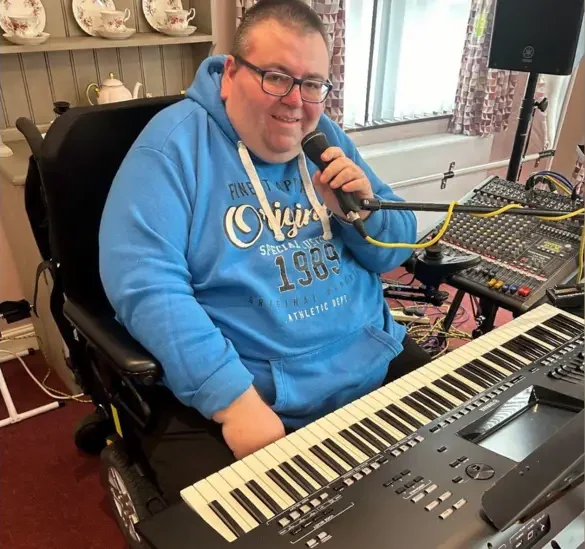
Stephen Farlow stroke survivor
Stephen Farlow’s earliest memories centre around music.
The 45-year-old can remember playing on a piano as a child before he could talk.
After Stephen suffered a bleed into the brain in 2016, his family were told it was unlikely he would survive.
He did recover but found soon he could sing easily before he was able to speak again.
Research shows that some people can sing even if they cannot talk because we use different sides of our brains for speech and music.
Over a third of stroke survivors are able to sing better than speak soon after their stroke, according to new research from the Stroke Association.
Before his stroke, Stephen was working in a music shop and gigging as a musician.
His love for singing showed signs in the early stages of his recovery after he returned home after spending four months in hospital.
He told BBC Radio Foyle’s North West Today programme: “Music is my life, it means everything to me.
“After I had my stroke, I could only say a couple of words and they were ‘keyboard’ and ‘guitar’ but I was using them in the wrong context.
“I lost faith after my stroke. I found it difficult to comprehend. It was terrible.
“I love country music, singers like Dominic Kirwan and Daniel O’Donnell.
“I found I could sing better than I could speak and I felt then maybe, that yes, I could perform again.”
With support and encouragement from family and friends, Stephen, from Coleraine, slowly started to return to music by relearning how to play the keyboard with his left hand after losing the power in his right side.
His wife Pauline said music gave Stephen a focus in his recovery that also helped with his mental health.
“We got a singing teacher to help Stephen and very quickly he picked it up again,” she told the BBC radio programme.
“It helped his mental health straight away.
“Our local church and social club let him use their hall to practice.
“He just felt on top of the world again”, she said.
Pauline said they had been told at one stage that Stephen would be bed-bound and require constant care following his stroke.
“Music was all Stephen had on his mind, that was so powerful, that gave him the determination to be the person he is today,” she said.
“It gave him the motivation to get out of bed, practice his speech.
“Music gave him the strength to help me return to the Stephen he was before the stroke.”
Tags:




